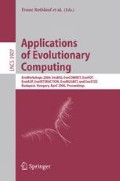Abstract
This paper discusses Mixed-Integer Evolution Strategies and their application to an automatic image analysis system for IntraVascular UltraSound (IVUS) images. Mixed-Integer Evolution Strategies can optimize different types of decision variables, including continuous, nominal discrete, and ordinal discrete values. The algorithm is first applied to a set of test problems with scalable ruggedness and dimensionality. The algorithm is then applied to the optimization of an IVUS image analysis system. The performance of this system depends on a large number of parameters that – so far – need to be chosen manually by a human expert. It will be shown that a mixed-integer evolution strategy algorithm can significantly improve these parameters compared to the manual settings by the human expert.
Access this chapter
Tax calculation will be finalised at checkout
Purchases are for personal use only
Preview
Unable to display preview. Download preview PDF.
References
Bovenkamp, E.G.P., Dijkstra, J., Bosch, J.G., Reiber, J.H.C.: Multi-agent segmentation of IVUS images. Pattern Recognition 37(4), 647–663 (2004)
Emmerich, M., Schütz, M., Gross, B., Grötzner, M.: Mixed-Integer Evolution Strategy for Chemical Plant Optimization. In: Parmee, I.C. (ed.) Evolutionary Design and Manufacture (ACDM 2000), pp. 55–67. Springer, NY (2000)
Emmerich, M., Grötzner, M., Schütz, M.: Design of Graph-based Evolutionary Algorithms: A case study for Chemical Process Networks. Evolutionary Computation 9(3), 329–354 (2001)
Hoffmeister, F., Sprave, J.: Problem independent handling of constraints by use of metric penalty functions. In: Fogel, L.J., Angeline, P.J., Bäck, T. (eds.) Evolutionary Programming V - Proc. Fifth Annual Conf. Evolutionary Programming (EP 1996), pp. 289–294. The MIT Press, Cambridge (1996)
Koning, G., Dijkstra, J., von Birgelen, C., Tuinenburg, J.C., Brunette, J., Tardif, J.-C., Oemrawsingh, P.W., Sieling, C., Melsa, S.: Advanced contour detection for threedimensional intracoronary ultrasound: validation – in vitro and in vivo. The International Journal of Cardiovascular Imaging (18), 235–248 (2002)
Newell, A.: Unified Theories of Cognition. Harvard University Press, Cambridge (1990) Number ISBN 0-674-92101-1
Rudolph, G.: An Evolutionary Algorithm for Integer Programming. In: Davidor, Y., Männer, R., Schwefel, H.-P. (eds.) PPSN 1994. LNCS, vol. 866, pp. 139–148. Springer, Heidelberg (1994)
Schwefel, H.-P.: Evolution and Optimum Seeking. Sixth Generation Computing Series. John Wiley, NY (1995)
Author information
Authors and Affiliations
Editor information
Editors and Affiliations
Rights and permissions
Copyright information
© 2006 Springer-Verlag Berlin Heidelberg
About this paper
Cite this paper
Li, R. et al. (2006). Mixed-Integer Evolution Strategies and Their Application to Intravascular Ultrasound Image Analysis. In: Rothlauf, F., et al. Applications of Evolutionary Computing. EvoWorkshops 2006. Lecture Notes in Computer Science, vol 3907. Springer, Berlin, Heidelberg. https://doi.org/10.1007/11732242_37
Download citation
DOI: https://doi.org/10.1007/11732242_37
Publisher Name: Springer, Berlin, Heidelberg
Print ISBN: 978-3-540-33237-4
Online ISBN: 978-3-540-33238-1
eBook Packages: Computer ScienceComputer Science (R0)

